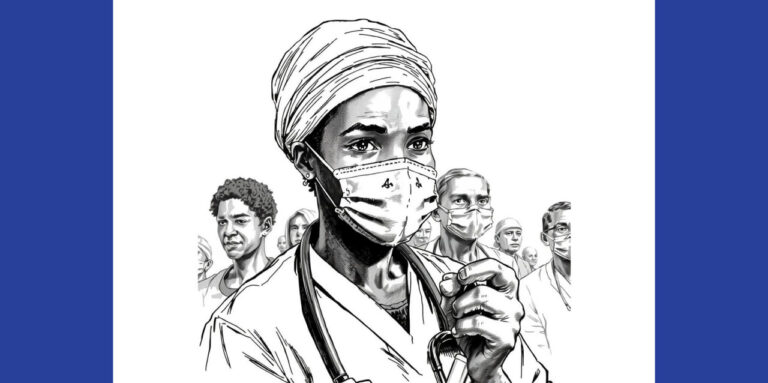In recent weeks, the plight of Ethiopia’s health professionals has moved from the quiet corridors of hospitals to the front pages of national and international news. Doctors, nurses, and allied health workers have taken the extraordinary step of striking, not out of political ambition, but out of desperation—a last resort after years of unheeded pleas for fair pay, humane working conditions, and basic respect. Their demands are not only legitimate; they are a matter of national survival. It is time for the government and society at large to listen, respect, and act—rather than respond with force and intimidation.The current crisis did not emerge overnight. For years, Ethiopia’s health professionals have endured what can only be described as systemic neglect and abuse. Their salaries are meager, often failing to cover even the most basic living expenses. Many are forced to work in dilapidated facilities, lacking essential supplies and equipment. Housing is scarce, benefits are minimal, and job security is tenuous at best. Despite these hardships, health workers have continued to serve, motivated by a sense of duty to their communities and the ethical standards of their profession.The COVID-19 pandemic laid bare the depth of their sacrifice. Many risked—and some lost—their lives to save others. Yet, as the crisis faded from headlines, so too did the fleeting recognition of their heroism. Today, those same professionals find themselves on the brink of destitution, some even going hungry, while the government spends lavishly on other priorities. The contrast is stark: those who heal the nation are left to suffer, while those who contribute little to the public good enjoy privilege and comfort.The indignities do not end with poor pay and conditions. Health professionals have reported harassment, intimidation, and even arrest for daring to speak out or organize for their rights. Recent strikes have been met not with empathy or negotiation, but with threats, detentions, and accusations of “malicious intent.” Amnesty International and other human rights organizations have raised alarms about arbitrary arrests and the broader crackdown on dissent.This is not merely a labor dispute; it is a crisis of dignity. Health professionals are not asking for luxury—they are asking for the ability to live and work with dignity, to provide for their families, and to serve their patients without fear. Their demands include fair compensation, reasonable working hours, hazard pay, housing and transportation allowances, free medical care for themselves and their families, and an end to harassment and abuse.The consequences of ignoring these demands are grave. Ethiopia already faces a severe shortage of health workers—just 0.76 physicians per 10,000 people, far below the World Health Organization’s recommended threshold. The result is a crushing workload for those who remain, with one doctor often responsible for more than 13,000 patients. This is unsustainable and dangerous, not just for the professionals but for the entire population.When health professionals are driven to resign, emigrate, or abandon their posts, it is the public who suffers. Hospitals are left understaffed, patients go untreated, and preventable deaths rise. The exodus of skilled workers—often referred to as “brain drain”—further weakens an already fragile healthcare system. The government’s attempts to quash dissent through force only accelerate this downward spiral, eroding trust and driving more professionals away.The government’s response so far has been deeply disappointing. Instead of engaging in genuine dialogue, authorities have resorted to legal threats, intimidation, and arrests. The Ministry of Health has issued stern warnings, insisting that strikes are “legally prohibited” and threatening legal consequences for those who refuse to return to work. Yet, health professionals have repeatedly stated that their actions are not political—they are a plea for survival, for themselves and their patients.Professional associations, including the Ethiopian Medical Association, have called for the immediate release of detained colleagues and urged the government to respond promptly and constructively to the profession’s demands. The government must recognize that force will not solve this crisis. Only honest, inclusive dialogue—grounded in respect and a shared commitment to the public good—can lead to lasting solutions.This is not just a sectoral issue; it is a matter of national security. A healthy population is the foundation of any nation’s prosperity and stability. When those tasked with safeguarding public health are themselves in crisis, the entire country is at risk. The ongoing strikes and resignations are not just a warning—they are a clarion call for urgent reform.The government must act decisively to address the root causes of this crisis. This means not only meeting the immediate demands of health professionals but also investing in the long-term sustainability of the healthcare system. It means creating an environment where health workers are valued, protected, and empowered to do their jobs to the best of their ability.Respecting health professionals is not merely a matter of fairness; it is a strategic imperative. Their expertise, dedication, and sacrifice are irreplaceable assets to the nation. They have earned the right to be heard, to negotiate, and to live with dignity. The government must abandon its adversarial posture and embrace a spirit of partnership and mutual respect.This begins with immediate steps: releasing detained professionals, halting intimidation and harassment, and opening transparent, good-faith negotiations with representatives of the health sector. It continues with substantive reforms: raising salaries to regional benchmarks, improving working conditions, providing adequate housing and benefits, and ensuring that health professionals have a real voice in the policies that affect their lives and work.How Ethiopia responds to this crisis will be a test of its leadership and its values. Will it choose repression and denial, or will it choose dialogue, respect, and reform? The answer will shape not only the future of the health sector but the future of the nation itself.The health professionals of Ethiopia have given their all for their country. Now, the country must give them the respect, recognition, and support they so richly deserve. Their voices must not only be heard—they must be heeded. The time for action is now.
The responsibilities that set freelancers apart from the rest
As a freelancer, it’s important to understand that you operate in a different set of principles and responsibilities than your standard employee. This is true even if you do the majority or all of your work for a single client. As such, there’s a lot that new freelancers forget to do when they get started, but here, we’re going to look at some of the most common things that you should commit to your memory.
Marketing And Finding Work
If you want to secure clients and projects, then you have to promote and market yourself actively. Building a strong online presence, such as with your own website, social media platforms, and even on freelancing websites, is crucial, even if you’re currently getting all of your work from a single client. As such, if you lose that client, you’re able to rely on compelling portfolios and practised pitches to find new work to fill the gap. It’s always best to keep your outreach consistent so that you’re able to keep the work coming from different sources when you need to.
Managing And Paying Your Own Taxes
Unlike traditional employers, freelancers have to handle their tax affairs themselves, like a small business would. This means registering as self-employed, filing your tax return annually, as well as paying any National Insurance contributions yourself. Getting a good understanding of payments on account self assessment, as well as factors like expenses you can claim as a small business owner, ensures that you don’t fall behind. A common mistake for new freelancers is not to file their taxes until right up to the deadline, having to pay their whole tax bill at once rather than working at it throughout the year.
Setting Your Own Rates And Prices
As a freelancer, you are fully responsible for determining your own rates. You cannot expect your clients to do it for you in a way that ensures that you’re getting paid for the real value you bring or sticking to industry standards. If you have clients who do not pay you what you’re worth, then it’s important to either communicate with them and ask for more money to continue working with them or find new clients. This includes updating your prices each year to keep up with inflation.
Staying Legal And Compliant
If you’re with an employer, it’s their responsibility to ensure that you’re working in a way that fits with all the applicable laws and regulations. However, as a freelancer, it’s vital that you stay informed about your own obligations, including data protection laws like GDPR, industry-specific compliance, and ensuring you have the correct licences or insurance. If you work as a sole trader or a limited company, then your obligations may be different, but this doesn’t diminish your need to understand and work within them.
Working as a freelancer can be highly freeing and rewarding, not to mention flexible to your free time and needs. However, you also have to be ready for those extra responsibilities that come with it.
IMF austerity policies linked to declining public health, education services in Africa
A new report by ActionAid International has sharply criticized International Monetary Fund (IMF) austerity measures for the worsening state of public health and education services in Ethiopia and across Africa. Titled “The Human Cost of Public Sector Cuts in Africa,” the report highlights how IMF-driven budget cuts are severely impacting frontline workers and the communities they serve.Based on a survey of 616 individuals across six African countries—including Ethiopia, Ghana, Kenya, Liberia, Malawi, and Nigeria—the study reveals that austerity policies have led to increased workloads, declining real incomes, and resource shortages among teachers and health professionals.In Ethiopia, 91% of teachers surveyed expressed a strong desire to leave the profession, the highest among the countries studied. The report attributes this to inadequate pay and deteriorating working conditions. Since 2020, 84% of teachers across the six countries reported a 10% to 50% decline in real income, with Ethiopian teachers facing rising student-teacher ratios—especially in rural areas where the ratio increased by 80%.The lack of resources is acute: 95% of Ethiopian teachers reported insufficient funds for essential school materials, forcing 73% to purchase supplies out of pocket and 64% to share limited resources to keep classrooms running.Similarly, healthcare workers face severe challenges. Ninety percent of Ethiopian health professionals reported significant disruptions to maternity services due to budget cuts, while all surveyed public health experts noted sharp increases in drug prices, with Ethiopia among the hardest hit. Additionally, 97% of health workers said their salaries no longer cover basic living costs, exacerbated by growing workloads.ActionAid urges the Ethiopian government, in collaboration with the Ministries of Finance, Health, and Education, to allocate at least 20% of the national budget to education and 15% to healthcare—benchmarks aligned with international standards such as the Abuja Declaration.The report calls for urgent reforms including progressive tax policies, debt cancellation or relief, and an end to IMF-imposed austerity and privatization demands. It advocates for democratizing debt decisions through frameworks like the proposed UN Sovereign Debt Framework Agreement and UN Tax Framework Agreement.Emphasizing gender equality, the report urges adherence to commitments from the Beijing Declaration and Action Forum, highlighting the importance of integrating women’s rights into economic policies.The study criticizes current debt sustainability analyses for prioritizing debt repayment over essential public spending on health, education, and social protection. It calls for incorporating human rights and development impacts into these assessments to ensure social spending is recognized as a vital part of public budgets.ActionAid warns that austerity-driven cuts risk deepening poverty, worsening inequality, and fueling social unrest. The report urges the IMF and World Bank to end austerity policies and public sector wage reductions in African countries, and instead support reforms that boost government revenues through fair taxation and debt restructuring.
CBE drives financial inclusion through digital transformation
The Commercial Bank of Ethiopia (CBE) is spearheading a nationwide push to expand financial inclusion by harnessing digital technology to reach millions of underserved citizens across the country. This was highlighted by CBE President Abie Sano during a panel discussion at the recent two-day Ethiopia Finance Forum.Abie acknowledged the bank’s historical focus on financing government projects, which limited its role in broadening access to finance for the general public. “For many years, we thought opening a branch or setting up a bank account was enough,” he said. “But it was never about financing public projects and not to finance them.”Now, with digital technology rapidly advancing, CBE is adopting a new mindset aimed at reaching everyone interested in financial services. This includes rethinking lending practices by easing collateral requirements and empowering local branches to approve small loans, thus facilitating access for individuals and micro, small, and medium enterprises (MSMEs).CBE’s pilot digital finance program has already financed over 24,000 borrowers with 2.3 billion birr. A major project in partnership with fintech firms has provided 14 billion birr in fertilizer financing, benefiting nearly half a million farmers in the Oromia region. “This gives me great hope that we can scale up to finance millions, not just thousands,” Abie stated.Currently, MSMEs remain under-served, with only about 9,000 borrowers. However, the bank sees substantial growth potential in this sector. Non-interest banking products have also expanded significantly, with 7.1 million savings accounts and deposits totaling 180 billion birr, alongside 71 billion birr in loans issued.Abie stressed the importance of financial literacy to overcome misconceptions that banks are not for the poor or small businesses. “Even small businesses don’t dare to come to the bank,” he noted. “We need to teach them how to manage their businesses and access banks.”To address these challenges, CBE plans to broaden its digital finance offerings through partnerships with fintech companies and telecom operators, while leveraging its mobile banking platform to serve salaried workers and eventually provide personal loans for housing, vehicles, and other needs.Specialized products are also being developed for farmers, including financing for irrigation equipment, solar energy installations, and biofuels.While optimizing resources by reducing branches in larger cities, CBE is expanding its presence in underserved rural areas, targeting over 270 districts currently lacking banking services.The World Bank’s $700 million Financial Sector Consolidation Project (FSSP) will support these reforms by strengthening state financial institutions like CBE and the Ethiopian Development Bank, modernizing regulations, and providing capital injections and technical assistance.






